Supreme Court: In an appeal filed against the compensation granted in a motor accident case, where the claimant lost both his legs, the Division Bench of Sudhanshu Dhulia and K. Vinod Chandran*, JJ. held that the Tribunal had erred in finding contributory negligence on the part of the scooter driver, and the High Court had similarly committed the same error in affirming the Tribunal’s decision. The Court ruled that the appellant was entitled to compensation from the insurer of the offending vehicle. The Court further opined that the entire amount of ₹16,00,000/- should be awarded as compensation, considering that the accident occurred in 1999, and it would be unjust to base the award on the present circumstances, 25 years later. The long delay in the proceedings was compensated by the interest awarded.
Background
A young Block Development Officer (BDO), riding as a pillion passenger on a scooter, was involved in an accident that led to the amputation of both his legs. The injured appellant filed an application for compensation under Section 166 of the Motor Vehicles Act, 1988, seeking a total of ₹16,00,000/- under various heads. The Motor Accidents Claims Tribunal (‘Tribunal’) awarded a compensation of ₹7,50,000/- and directed the insurer of the offending vehicle to pay ₹4,50,000/-, holding that the scooter driver should have been more cautious. The remaining liability of ₹3,00,000/- was to be paid by the owner of the scooter, who was also the driver. The insurance company was directed to pay the full amount and recover the liability from the scooter owner. An appeal was subsequently filed against this order, which was dismissed by the High Court. The Court, after examining a sketch map of the accident site, concluded that the vehicles were traveling in opposite directions. Upon reviewing the discrepancies in the depositions of the appellant and two eyewitnesses, the Court determined that the accident occurred after the long trailer had almost passed the scooter and not in a head-on collision, as suggested by one of the witnesses. The Court further held that the scooter driver, who held only a learner’s license, should have been more careful, as he had a better view than the trailer driver. It was noted that despite the scooter driver’s limited license, the appellant had insisted on being carried as a pillion rider, and the driver complied, partly because of the appellant’s position as a BDO. The Court found that the appellant had abused his authority and forced the commission of an illegal act, which ultimately led to the tragic accident and his subsequent injuries. Therefore, the appeal was dismissed, with the concurrent judgments concluding that both the trailer driver and the scooter driver were partially negligent in the incident.
Analysis and Decision
The Court noted that the insurer had not raised the issue of contributory negligence on the part of the scooter driver in the written statement filed before the Tribunal. Additionally, there was no serious challenge to the deposition of the appellant regarding the manner in which the accident occurred during cross-examination. Two eyewitnesses were examined, but their testimonies were disbelieved by the Tribunal on the grounds that they were not listed as witnesses in the criminal case. In this context, the Court said that the High Court should not have gone to great lengths to reconcile the depositions of all three witnesses.
The Court further noted that the Tribunal had found that, due to the significant length of the trailer, the scooter driver should have exercised greater caution. The High Court, however, concluded that since there was no head-on collision, some negligence on the part of the scooter driver must also be attributed. Moreover, the High Court found that the BDO had misused his position by coercing the scooter driver/owner to carry him as a pillion rider, despite knowing that the driver held only a learner’s license. This contention was raised by the scooter driver/owner in his written statement, but he never examined himself before the Tribunal. Given this, the Court concluded that the High Court should not have placed any reliance on the version of the scooter driver/owner, as the appellant had no opportunity to dispute it through cross-examination.
The Court highlighted that in a motor accident claim, there is no adversarial litigation, and it is the preponderance of probabilities which reign supreme in adjudication of the tortious liability flowing from it.1
After referring to the case Dulcina Fernandes v. Joaquim Xavier Cruz, (2013) 10 SCC 646, the Court found that in the present case, after investigation, the Police had chargesheeted the driver of the trailer, indicating clear negligence on his part, which led to the accident. This chargesheet was not contradicted by the respondents before the Tribunal, either through valid evidence or pleadings. The Tribunal, however, made an imaginative surmise that since the scooter had collided with the tail-end of the trailer, it could be presumed that the scooter driver was not cautious. This presumption, in any case, did not amount to a valid finding of negligence.
The court remarked that “finding that the driver was not cautious is one thing and finding negligence is quite another thing. Prima facie, the negligence was on the trailer driver as discernible from the evidence recorded before the Tribunal; standard of proof required being preponderance of probability”.
Whether negligence can be found on the ground that the driver of the scooter had only a learner’s licence.
The Court concluded that, having found the trailer to have been driven rashly and negligently, the mere fact that the scooter driver held only a learner’s licence did not necessarily lead to a conclusion of contributory negligence on the part of the scooter driver. The Court also held that no negligence could be attributed to the scooter driver solely based on the fact that the accident occurred at the tail-end of a long trailer, especially considering that the scooter driver had better visibility. The Court noted such a finding is a question of fact that must be proved, rather than simply presumed.
Therefore, the Court concluded that the Tribunal erred in finding contributory negligence of the scooter driver and the High Court too committed a similar error in affirming it. The appellant was entitled to compensation from the insurer of the offending vehicle, which is unequivocally found to be the trailer; which is covered by a valid policy as admitted by the insurance company.
Concerning the compensation payable, the Court opined that the entire amount of ₹16,00,000/- should be awarded as compensation, considering that the accident occurred in 1999, and the award cannot be based on the present circumstances, 25 years later. The long delay in the proceedings was compensated for by the interest awarded. The quantum of compensation was determined based on the peculiar facts and circumstances of this case.
The Court directed that the amounts awarded, after deducting ₹25,000/- received under Section 140 of the Motor Vehicles Act, be paid to the appellant along with 7% simple interest per annum from the date of the award. The insurance company was instructed to calculate the amounts and inform the appellant accordingly. The appellant was further directed to provide his bank account number upon receiving the order, so that the amount can be deposited via RTGS/NEFT transfer within two months from the date of receipt of the judgment.
CASE DETAILS
|
Citation: Appellants : Respondents : |
Advocates who appeared in this case For Petitioner(s): For Respondent(s): |
CORAM :
1. Sunita v. Rajasthan State Road Transport Corporation, (2020) 13 SCC 486.








